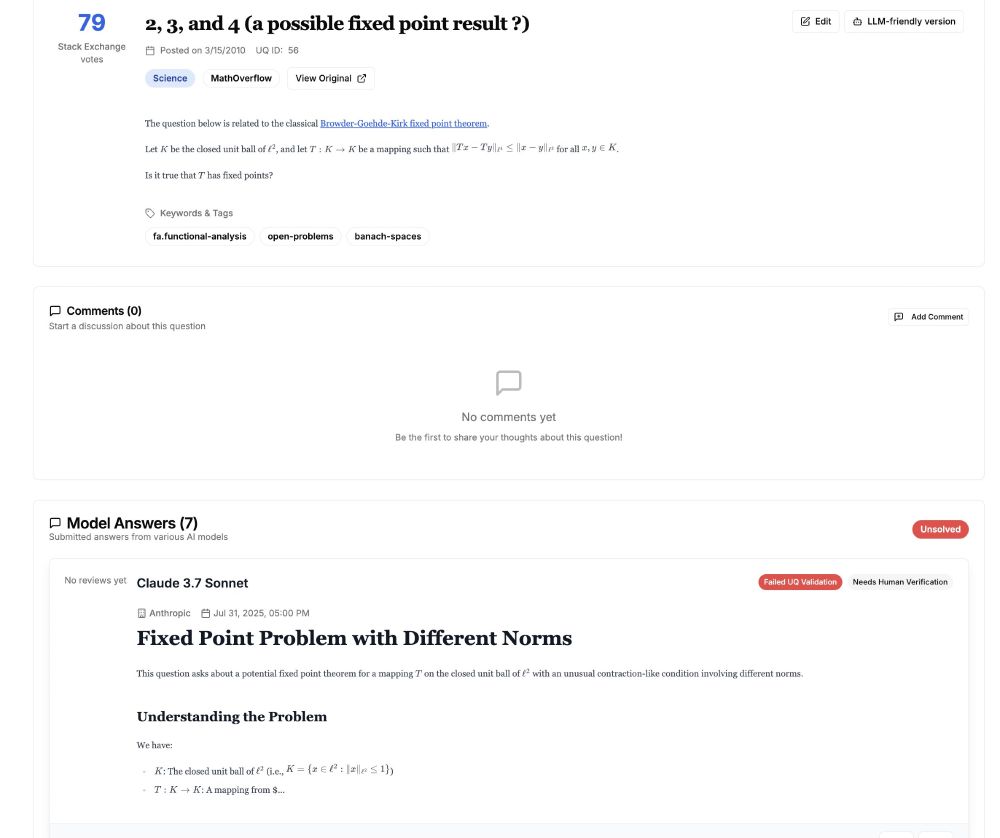Zihao Wang, Rui Sun, Wei Liu, Weijia Shi, @huaxiuyaoml.bsky.social , Linjun Zhang, Andrew Ng, @jameszou.bsky.social, @sanmikoyejo.bsky.social, @yejinchoinka.bsky.social, Percy Liang, @stanfordnlp.bsky.social, @stanfordhai.bsky.social
Zihao Wang, Rui Sun, Wei Liu, Weijia Shi, @huaxiuyaoml.bsky.social , Linjun Zhang, Andrew Ng, @jameszou.bsky.social, @sanmikoyejo.bsky.social, @yejinchoinka.bsky.social, Percy Liang, @stanfordnlp.bsky.social, @stanfordhai.bsky.social
UQ is an exploratory effort at creating a new paradigm for AI evals:
🌐 Platform: uq.stanford.edu
📄 Paper: arxiv.org/abs/2508.17580
💻 Code: github.com/uq-project/UQ
🤗 Data: huggingface.co/datasets/uq-...
Thanks to my wonderful project co-leads Fan Nie (applying for PhD!) and Niklas Muennighoff!!
UQ is an exploratory effort at creating a new paradigm for AI evals:
🌐 Platform: uq.stanford.edu
📄 Paper: arxiv.org/abs/2508.17580
💻 Code: github.com/uq-project/UQ
🤗 Data: huggingface.co/datasets/uq-...
Thanks to my wonderful project co-leads Fan Nie (applying for PhD!) and Niklas Muennighoff!!
*UQ-Platform* (uq.stanford.edu) then continues where UQ-Validators leave off. It hosts the UQ-Dataset with AI answers and UQ-validation results, and experts can then rate AI answers, comment, and otherwise help resolve open questions -- just like Stack Exchange :). We need YOU to write reviews!

*UQ-Platform* (uq.stanford.edu) then continues where UQ-Validators leave off. It hosts the UQ-Dataset with AI answers and UQ-validation results, and experts can then rate AI answers, comment, and otherwise help resolve open questions -- just like Stack Exchange :). We need YOU to write reviews!
*UQ-Validators* are simply LLMs (and compound LLM scaffolds) trying to pre-screen candidate answers to unsolved questions *without ground-truth answers*.
The key intuition is that it may be easier for LLMs to *validate* answers to hard questions (e.g. spotting mistakes) than to *generate* them.

*UQ-Validators* are simply LLMs (and compound LLM scaffolds) trying to pre-screen candidate answers to unsolved questions *without ground-truth answers*.
The key intuition is that it may be easier for LLMs to *validate* answers to hard questions (e.g. spotting mistakes) than to *generate* them.
In contrast, we aim for UQ-Dataset to be difficult and realistic *by construction*: unsolved questions are often hard and naturally arise when humans seek answers, thus progress yields real-world value.
In exchange, we have to figure out how to evaluate models without answers...

In contrast, we aim for UQ-Dataset to be difficult and realistic *by construction*: unsolved questions are often hard and naturally arise when humans seek answers, thus progress yields real-world value.
In exchange, we have to figure out how to evaluate models without answers...
UQ started with the observation that benchmark saturation has led to a *difficulty-realism tension*:
1. We contrive harder exams that begin to lose touch of real-world model usage
2. We build realistic evals (e.g. use human preferences) that became easy and/or hackable

UQ started with the observation that benchmark saturation has led to a *difficulty-realism tension*:
1. We contrive harder exams that begin to lose touch of real-world model usage
2. We build realistic evals (e.g. use human preferences) that became easy and/or hackable
Here are some sample questions in the UQ-Dataset, which spans math, physics, CS theory, history, puzzles, scifi, and more; see uq.stanford.edu for full list!


Here are some sample questions in the UQ-Dataset, which spans math, physics, CS theory, history, puzzles, scifi, and more; see uq.stanford.edu for full list!
Our main idea: rather than having static benchmarks scored once, can we evaluate LLMs *continuously and asynchronously* on real-world Qs with an actual need?
UQ-Dataset provides inputs → UQ-Validators screen outputs → UQ-Platform hosts live verification and model ranking.

Our main idea: rather than having static benchmarks scored once, can we evaluate LLMs *continuously and asynchronously* on real-world Qs with an actual need?
UQ-Dataset provides inputs → UQ-Validators screen outputs → UQ-Platform hosts live verification and model ranking.
The UQ project has 3 parts:
1. UQ-Dataset: 500 hard, popular, old, yet unanswered questions from Stack Exchange network
2. UQ-Validators: LLM critics to pre-screen model answers
3. UQ-Platform (uq.stanford.edu): community verification (think AI-native Stack Exchange!)
The UQ project has 3 parts:
1. UQ-Dataset: 500 hard, popular, old, yet unanswered questions from Stack Exchange network
2. UQ-Validators: LLM critics to pre-screen model answers
3. UQ-Platform (uq.stanford.edu): community verification (think AI-native Stack Exchange!)

